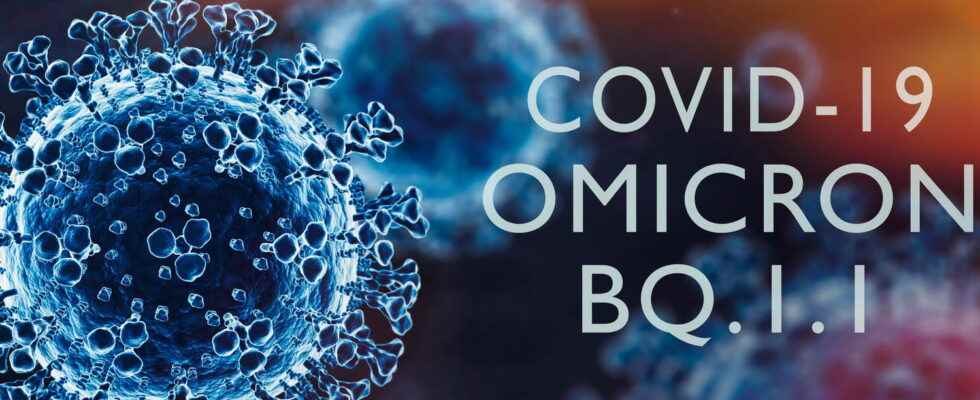NEW VARIANT. A subline of the BA5 variant of Omicron, the Covid BQ.1.1 variant has been increasing in France “significantly” since the beginning of October. It could become the majority by early 2023. What are the risks? Symptoms ? What we know so far.
[Mise à jour le 26 octobre 2022 à 17h15] Another new variant of covid under surveillance. Spotted in Africa then in Europethe variant BQ.1.1 -also written “BQ11“- is increasing in France. Sublineage of the BA.5 Omicron variant, “He presented at the beginning of October a significant increase curve” point the members of the Covars in a Notice of October 24, 2022 before specifying that its “level of immune escape is uncertain”. Between mid-September and early October, it went from 2% to 16% in Covid test sequences analyzed by Public Health France. It is also increasing in other European countries. According to the models reported by theECDCit is expected thatbetween mid-November and early December, more than 50% of SARS-CoV-2 infections in Europe are due to BQ.1/BQ.1.1. Beginning 2023this number will climb to more than 80%. To date, nothing shows that it will be more severe than the previous variants of Covid. Should we be worried? What is this new BQ1.1 variant? Info to date.
What is the new Covid BQ.1.1 variant?
The variant BQ.1.1 is a sub-lineage of BQ.1, himself sub-lineage of BA.5, himself sublineage of the Omicron variant, himself Sars-Cov-2 virus variant of Covid-19. The sub-lineage BA.5 is the majority in France and internationally. Within BA.5, many sub-lineages have been defined, of which the BQ.1.1 in October. “BQ.1 is characterized by the N460K mutation, and BQ.1.1 additionally carries the R346K mutation” indicates Public Health France in thevariant analysis published on October 5, 2022. They circulate widely in Nigeria and appear to be increasing in some European countries (Austria, Belgium, Denmark, France, Italy, Netherlands, United Kingdom) and in North America. The BQ.1 variant was classified as “VOI” i.e. “variant to follow” by theECDC October 20.
As a reminder, the vast majority of viruses are characterized by their constant genetic evolution, more or less rapid. This genetic evolution is associated with mutations or deletions in the genetic code of the virus which leads to the appearance of “variants”. “For a virus like SARS-CoV-2, the emergence of variants over time is therefore an expected phenomenon” remember Public Health France. Among these variants, so-called “worrying” or “VOC” variants in English (Alpha, Beta, Gamma, Delta and Omicron (the last VOC appeared at the end of November 2021 in France).

How many cases in France?
It is not possible to know precisely how many Covid-positive cases in France currently fall under the BQ.1.1 variant since the laboratories no longer directly look for the variant associated with a positive test but the type of mutations. In early October, Santé Publique France reported an increase in the circulation of BQ.1.1 in Europe, particularly in France. In the epidemiological bulletin of October 20, the agency was more precise, indicating that BQ.1.1 represented 2%, 7% then 16% of sequences interpretable during Flash surveys S38, S39 and S40, respectively (period from September 19 to October 9).
What are the symptoms of the BQ.1.1 variant?
According to the observations of doctors reported on social networks, the BQ.1.1 variant could be responsible for digestive symptoms and suggest the gastroenteritis. On Twitter for example, Dr Yves Coppieters, epidemiologist and Director of the Epidemiology and Biostatistics Research Center of the School of Public Health ofULB in Belgium, explains that he trains the symptoms “classics” of the Covid “and diarrhoea, vomiting, stomach aches that must be taken into account for people at higher risk”. In The ExpressJérôme Marty, president of the union of the French Union for a free medicine (Ufml) general practitioner in Haute-Garonne declared to have had “in one afternoon, three patients who complained of stomach aches before realizing they were positive for Covid”.
What are the risks of the BQ.1.1 variant?
The BQ.1.1 variant increased from 2 to 16% in the Covid tests analyzed by Santé Publique France between mid-September and early October. It is progressing quite quickly. However “it is too early to assess the possible impact of BQ.1.1 on the dynamics of the epidemic” explains the health agency. This depends in particular on the effects of its mutations, knowing thatit carries the N460K mutation and the R346K mutation. BQ.1.1 is “riddled with troublesome mutations” who could “constitute a threat to our immune system response“estimated Dr. Eric Topol, founder of the Scripps Research Translational Institute, in the Time. “If these mutations are located at important sites of the Spike proteinit is too early to assess the characteristics of this sub-lineage” provides Public Health France.
Sources: Covid epidemiological update, October 20, 2022, Public Health France / Variant risk analysis of October 5, 2022, Public Health France.
